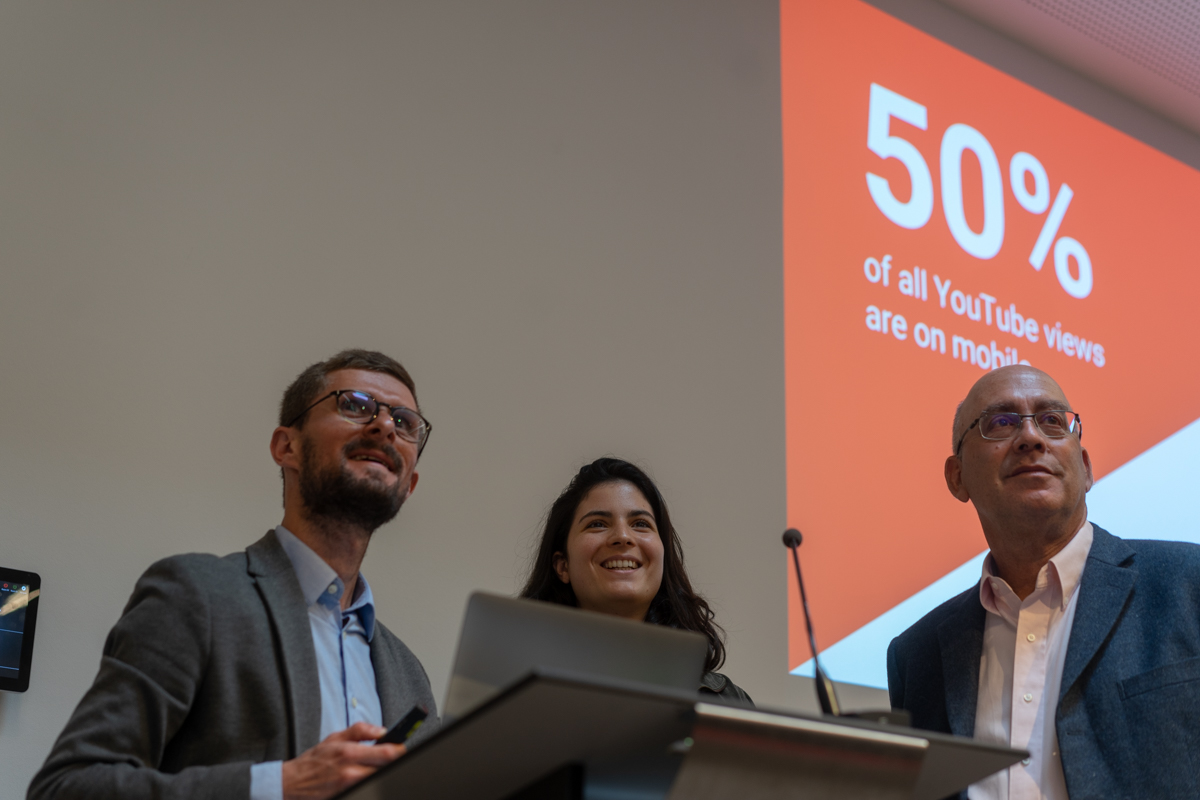Create, Connect, Engage: Digital Campaigning & Cybersecurity
More than ever before, social media and digital tools will impact the 2019 EP elections.

David Timis, on the left, and William Echikson, on the right, with a participant. Photo: Joseph Cochran
As the European Parliamentary Elections are approaching, candidates and political strategists have less than a month left to engage with citizens, mobilize their base and appeal to swing voters.Internet hacks and disinformation represent concrete threats to electoral runs-up, with “fake news” seen as a problem for democracy by 83% of Europeans.
In fact, according to the Parliament’s latest Eurobarometer survey, one third of Europeans of voting age are are reported not planning to vote, believing that their vote “won’t change anything”. Much of Institutional and political communication tend to be run on social media, but turning online interaction into active participation remains challenging. Initiatives to mobilize voters, such as #ThisTimeImVoting and #EUandMe, launched by the European Parliament to present information on the election process and to promote the achievements of the EU, have been received positively by users and more traditional media. However, we will have to wait until ballots are cast for an impact assessment on the voter turnout, which was only 42,6% in 2014.
How to run a successful digital election campaign was the subject of a training session organized by the Centre for European Policy Studies (CEPS), a Brussels-based think tank for EU affairs. The main speaker was David Timis, Google’s EU civic outreach fellow, and co-founder of European Heroes, a platform for the civic engagement of young Europeans. The event was moderated by William Echikson, CEPS’ Head of Digital Forum, Europe’s correspondent for the Wall Street Journal for decades, and former Senior Manager at Google. During the workshop, Timis shared a few but precious tips on how to establish a digital audience and counter cyberattacks.In fact, according to Timis, effective digital media campaigns are able to build a strong brand with clear-cut messages, an attractive storytelling of the actors involved and a straightforward mission statement. The goal is not only to attract views, but to connect with potential voters or activists and, ultimately, call for action.
Mobile Friendliness
Surfing the internet while on the move is a consolidated habit for the most of us. A Eurostat poll show that 65% of Europeans aged 16-75 use mobile devices to access the internet, proving that TV is no longer the main medium for audiovisual material. YouTube, the video streaming platform acquired by Google in 2006 for USD 1.65 billion, has over 1.8 billion monthly users . Streaming and sharing videos have become increasingly popular, with extensions like “live” and “stories” incorporated in various social networking platforms. Establishing a YouTube channel is now recommended for businesses and organizations, especially if they wish to attract a young viewership.
Contrary to popular belief, Timis pointed out, producing viral videos does not necessarily require a big budget: filming with a smartphone gives the public a glimpse of spontaneity and casualness. Accordingly, fast paced storylines and visual close-ups mimic real time human interaction, instilling audiences with the perception of being participants rather than just viewers. Successful campaigns, such as the one of Alexandria Ocasio-Cortez, now a Member of the House of Representatives in the US, prove that a multimillion-dollar funding is not indispensable: support from a tech-savvy team with a sharp social media strategy can lead to outstanding results. Charisma, creativity and a deep understanding of your target of reference all pay back in terms of popularity.
Other formats, including “behind the scenes” content, videos featuring supporters or volunteers and being endorsed by influencers are also important in the communication strategy.
Cybersecurity
As the distribution of media has become more and more related to the internet, the likelihood of sabotage through cyberattacks has increased. Political Campaigns are particularly exposed to such threats, with the Brexit referendum and the 2016 U.S Presidential Election being the most notorious cases. Attempts of hacking and “phishing” (the fraudulent attempt to steal information posing as a trustworthy entity) have become the most common attacks, but, according to Timis, they can be prevented.. The Cybersecurity Campaign Playbook , published by the Harvard Kennedy School, and quoted by Timis, suggests that raising awareness is paramount to counter malicious attacks. Simple measures, such as using long and different passwords for different accounts, storing sensitive information in web clouds and communicating through encrypted apps could make the difference. Other risk management tools include using a password manager and two-factor authentication (2FA), in which the second step of log-in relies on dedicated apps, safer than text messaging, or on security keys. Several of these tools are free or low-cost, making media literacy a fundamental asset for campaigners and social media managers to disallow data leaks and privacy breaching.
A digital future
When asked what the next big thing for the digitalization of Europe was going to be, Timis had no doubt: “They are already here: mobile and video have taken over the way we communicate and connect to each other, bringing parties, organizations and movements closer to the people they interact with.”, William Echikson, on the other hand, in virtue of his decades-long experience in reporting on EU affairs and policy research was more cautious: “for 30 years the Internet has had a sort of free pass. Recent scandals have shown that a more organic approach to regulations and policymaking needs to be implemented. It is a long way to go and it won’t be easy, but we are getting there”.
